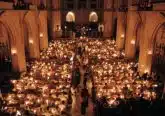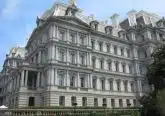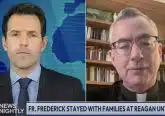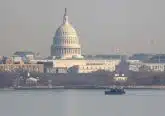DC archdiocese sues over Christmas Mass restrictions
CNA Staff, Dec 12, 2020 / 10:00 am MT (CNA).- The Archdiocese of Washington is suing the District of Columbia over restrictions on public worship during the coronavirus pandemic. The lawsuit was filed Friday in U.S. District Court of the District of Columbia.
“From the start of the pandemic,” the lawsuit argues, “the Roman Catholic Archbishop of Washington has worked with the District of Columbia to protect public health, including by voluntarily suspending public Masses in March.”
“Since Mass resumed in June, the Archdiocese has demonstrated that people can worship God in a safe, responsible, and cooperative way. This has led to an exemplary safety record,” said the archdiocese. “Yet as Christmas fast approaches, the District has imposed arbitrary 50- person caps on Mass attendance—even for masked, socially-distant services, and even when those services are held in churches that can in normal times host over a thousand people.”
The lawsuit, brought by the Becket Fund for Religious Liberty on behalf of the archdiocese, argues that the restrictions imposed by Mayor Muriel Bowser are “unscientific” and “discriminatory” and single out religious practice as a “disfavored activity” compared to other businesses and institutions not forced to adopt the same measures despite poorer safety records.
“Indeed, if the Archdiocese were to fill its churches with library books, washing machines, exercise bikes, restaurant tables, or shopping stalls instead of pews, the District would allow many more people to enter and remain for an unlimited amount of time,” said the suit.
“That is because for public libraries, laundromats, retail stores, restaurants, tattoo parlors, nail salons, fitness centers, and many other establishments, the District imposes capacity-based limits, rather than hard caps.”
The archdiocese said that, despite the imposition of the arbitrary 50-person limit, half of the Catholic churches in the District can accommodate 500 people or more. The Basilica of the National Shrine of the Immaculate Conception, located at The Catholic University of America in Washington, is the nation’s largest Catholic church. Although it can seat 10,000 people, it too is subject to the 50 person cap.
The suit brought by the Archdiocese of Washington is the latest in a series of challenges to state limits on public worship during the pandemic.
In November, the Supreme Court ruled 5-4 in favor of the Brooklyn Diocese and Orthodox Jewish synagogues in their case against New York’s COVID restrictions.
The court found that, while churches were restricted, other businesses deemed “essential” by the state did not have capacity limits indoors.
The majority opinion, joined by new Justice Amy Coney Barrett, stated that “even in a pandemic, the Constitution cannot be put away and forgotten.”
“The restrictions at issue here, by effectively barring many from attending religious services, strike at the very heart of the First Amendment’s guarantee of religious liberty,” the ruling concluded.
Since that decision was handed down by the Supreme Court, similar state restrictions which singled out religious worship have been dropped or overturned by federal courts. In California, the Ninth Circuit vacated a decision upholding state restrictions on public worship. Earlier this week, the Governor of Colorado asked the Supreme Court to drop a church’s lawsuit against the state after he lifted a COVID-related capacity limit on churches.
In the lawsuit filed Friday in Washington, the archdiocese cited the Supreme Court’s finding.
“That [decision] should have been reason enough for the District to abandon its illegal treatment of safe and responsible worship,” argued the archdiocese.
“Since the District has refused and Christmas is coming, the Archdiocese now has no choice but to seek judicial relief.”













